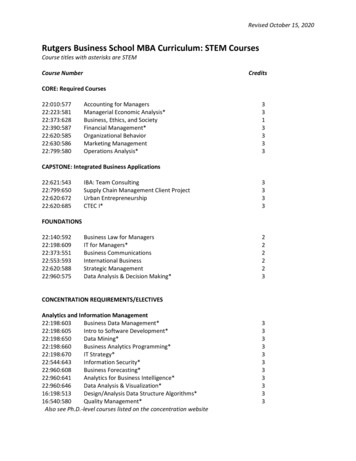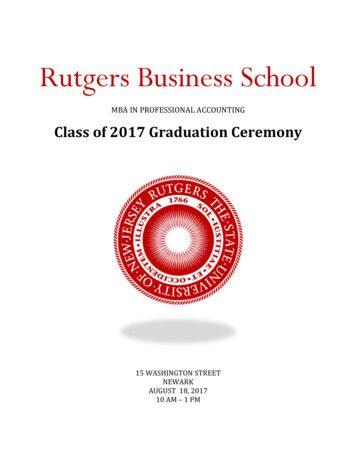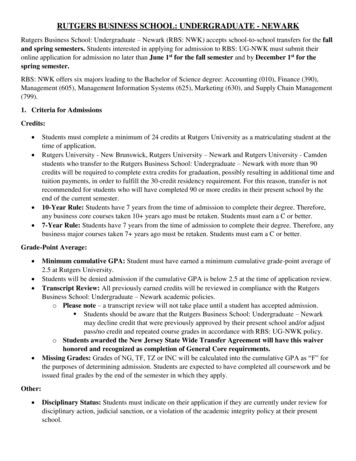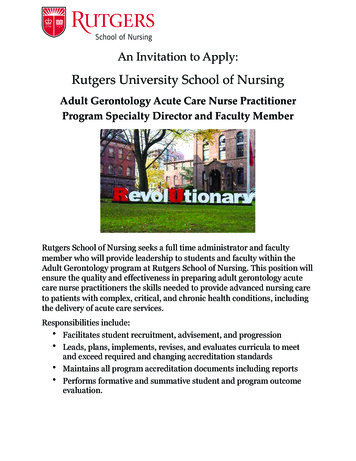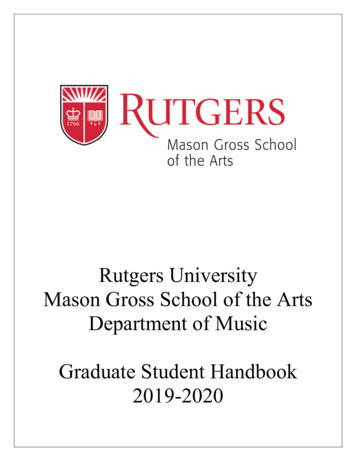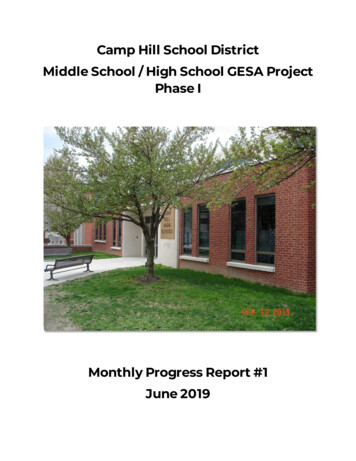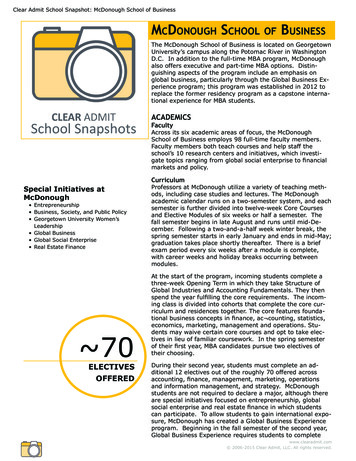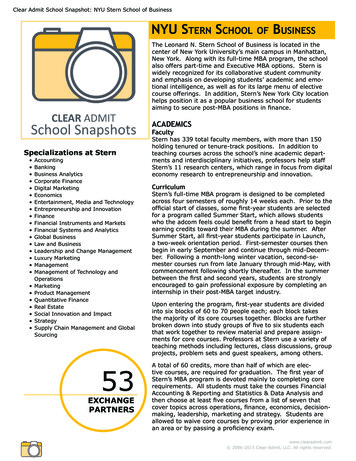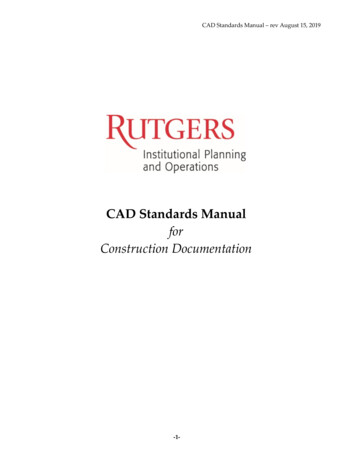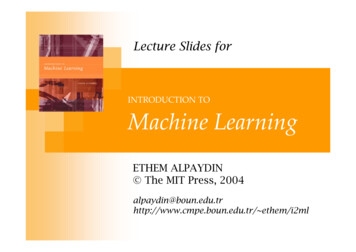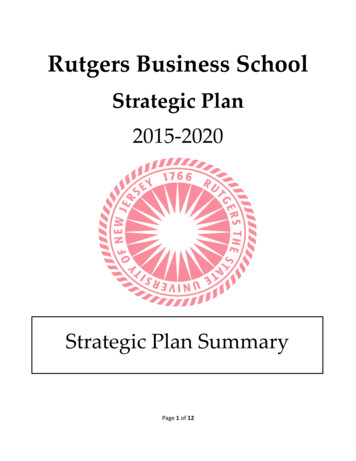
Transcription
Rutgers Business SchoolStrategic Plan2015-2020Strategic Plan SummaryPage 1 of 12
EXECUTIVE SUMMARYIn the wake of strategic plans developed by Rutgers University-Newark and Rutgers University-NewBrunswick, Rutgers Business School (RBS) is tasked with developing a strategic plan that embraces boththe Rutgers University-Newark anchor institution vision and the Rutgers University-New BrunswickAAU/CIC vision. Over the time period from 2015 to 2020, RBS will strive to achieve its Vision and Missionstatements (see immediately below). To achieve both, this strategic plan stresses the following threestrategic objectives: (1) enhancing RBS’s visibility; (2) creating social impact; and 3) generating revenuegrowth.VISIONTo be among the nation’s best public business schools as this is understood by all of ourconstituencies.MISSIONBy cultivating business knowledge, ethical judgment, and global perspective in ourstudents, by promoting innovative research and teaching, and by establishing robustbusiness partnerships, Rutgers Business School - Newark and New Brunswick serves NewJersey, its surrounding communities, and the world.STRATEGIC OBJECTIVESThe discussions and deliberations of the Strategic Planning Committee yielded the following threestrategic objectives:1) Enhancing RBS’s Visibility and Prominence. Gaining greater regional, national andinternational recognition will increase RBS’s visibility and prominence. Visibility is a product ofseveral factors: top-notch research by faculty, nationally-ranked academic programs, innovationsin business education, leadership in business school transformation trends, and impact uponpublic-private-community partnerships. To achieve this objective, we will rely upon thecollective efforts of our faculty, staff, students, corporate partners, and alumni.2) Creating Social Impact. Vigorous participation in economic and social development projectsshould be directed at all communities in which our university participates. In particular, as a majorpublic business school, it is incumbent upon us to make a measurable impact through our leadershipin public scholarship, bringing both our practical and theoretical knowledge to bear in contributingto the greater social good.3) Generating Revenue Growth. Increasing revenue will enable RBS to acquire the resourcesneeded to enhance its primary strategic objectives, namely, 1) visibility and prominence, and 2)social impact. It is anticipated that new program launches, innovations in our existing programs,and increased enrollment in all programs that include high-quality international and out-of-statestudents, will generate additional revenue.Page 2 of 12
RUTGERS BUSINESS SCHOOL’S STRATEGIC PLAN HIGHLIGHTS1. IntroductionIntegrate strategic priorities of Rutgers University – Newark with those of Rutgers University – NewBrunswick to create a plan that embraces both sets of priorities.II.A. Mission StatementBy cultivating business knowledge, ethical judgment, and global perspective in ourstudents, by promoting innovative research and teaching, and by establishing robustbusiness partnerships, Rutgers Business School - Newark and New Brunswick serves NewJersey, its surrounding communities, and the world.II.B. Strategic ObjectivesObjective 1: Enhancing Visibility and ProminenceObjective 2: Creating Social ImpactObjective 3: Generating Revenue GrowthIII. Competitive Environment Nationally and regionally (in the tri-state area), there is a declining trend in the number ofMBA applicants, as well as a decline in high school population and graduation rates.Specialized graduate degree programs (with lower cost and credit-hour requirements) aregrowing in demand.There is increasing competition from low-cost and flexible online programs. Within thenext decade, there is a risk that a significant number of B-schools will be eliminated due toextreme pricing pressures.Within Rutgers, a new financial management system, Responsibility-CenteredManagement (RCM), has been recently implemented.The traditional business faculty model (tenure-track faculty with Ph.D.s but little or nopractical business experience) is evolving towards a mixed model which combinesprofessional practice faculty with traditional tenure-track Ph.D. faculty.In response to the mega trends of globalization, urbanization, and digitization, businessschools nationally are faced with the task of transforming themselves to enhance the valuefor students, employers, and the business world.IV. Current Resources RBS has a world class faculty and is the home of 12 well-known academic journals.RBS employs faculty with superior academic credentials that bring us visibility nationallyand globally, and extensive business knowledge that builds up our reputation for classroomrelevance and a highly-ranked ROI for the RBS degree.RBS is headquartered in the most diversified university campus in the nation; its diverseand academically talented student body attracts top national and multinational firms torecruit the best of the best.Page 3 of 12
RBS currently has six strong academic departments with 199 full time faculty, offeringthree (3) undergraduate programs (in Newark, New Brunswick, and China) with 5,900undergraduate students, five (5) MBA programs (full time, part time, MBA in ProfessionalAccounting, EMBA, and International EMBA) with nearly 2,000 graduate students acrosseleven (11) concentrations, eight (8) specialty Master’s programs with nearly 600 students,and a Ph.D. Program with 184 students.RBS has an outstanding Executive Education unit (RBSEE) that delivers top qualityacademic programs and training to the corporate sector.RBS has a dedicated staff of 161 personnel spread across academic departments, degreeprograms, research centers, and administrative offices.RBS has eighteen (18) research centers and institutes. Six (6) of these are associated withacademic programs, four (4) are principally focused on community outreach, and the restare geared towards promoting research in particular niche areas. One additional center isin the process of being established to offer a niche academic program in the business offashion.RBS is housed in two new and modern buildings, one on each campus. The one in Newarkwas completed/renovated in 2007 (with further renovations and expansion planned forfloors 1, 2 and 6, which will include more classrooms as well as a dedicated floor forgraduate students), and the one in New Brunswick was completed in 2014.RBS has its own research park, which is a showroom for our faculty research and theirapplications toward solving real world business problems.RBS currently enjoys the support of over 260 corporate sponsors and 33,000-plus alumni.V. Strategic Objective – Enhancing Our VisibilityRBS amalgamates the strategic priorities of two remarkable universities— Rutgers University–Newark and Rutgers University–New Brunswick— in a mutually self-reinforcing way. At RutgersUniversity-Newark, we are leaders in business education keenly attuned to national and internationaleconomic climates, housing a highly-ranked MBA Program (full-time and part-time), many vibrantspecialized graduate programs, and a growing undergraduate program nationally acclaimed for itsdiversity. These programs propel growth and create social impact through our strong public, private,and community partnerships. RBS in Rutgers University-New Brunswick recruits highly selectiveand academically-talented undergraduate students to the AAU/CIC campus (over 30% of Fall 2015students are honors students), ranks highly in national rankings by U.S. News & World Report, andserves as a central hub for its part-time MBA program in central Jersey. Together, RBS programs onboth campuses help to develop the nation’s future business leaders and enable them to thrive.Since 2015, with the strong teamwork of RBS faculty/staff/students/alumni/corporate sponsors, wehave achieved the following accolades: Ranked Top 50 Best Business Schools in the nation, US News & World Report, March 2015#2 for MBA student placement rate in the CIC, US News & World Report, 2015#1 public program in the Tri-state area for MS Financial Analysis, The Financial Engineer,February 2015#6 in the nation for Undergraduate Supply Chain Management, Software Advice, February 2015#8 for Salary Increase, #16 in Total Salary, #4 in the Big Ten Conference and #20 overall in US,RBS-EMBA program, Financial Times 2014Page 4 of 12
#9 in the country for ROI, Fortune, April 2015#11 in the nation for Best Online Graduate Business Programs for Veterans (GovernmentalAccounting), U.S. News & World Report, 2015#11 for Supply Chain Management, US News & World Report, March 2015#13 in nation, Governmental Accounting Program, US News & World Report ranking of OnlineNon-MBA Programs, 2015#24 Best Public Business Schools in the nation, US News & World Report, March 2015#32 in Top 50 Best Value MBA Programs in the nation, Value Colleges, May 2015Top 5 Destination Globally for Pharma/Healthcare MBAs, MBA-Universe.com, April 2015Journal of International Business Studies, John Cantwell, Editor-in-Chief, ranked 4th as a worldelite journal, ABS 2015Best 50 Women in Business Award to Lei Lei, NJBiz, February 20152015 employment rate of RBS-Newark Undergraduate students reached 92%Launched the inaugural Rutgers EMBA Business Conditions Index, the REMBA-BCILaunched the RBX project on technology innovations for B-EducationJersey Bound (retail store operated and managed by RBS students, with merchandise 100% madein New Jersey), opened in January 2015, in Newark Airport (Terminal B)Winner of prestigious R. Gene Richter Scholarship (Marchela Stancheva), ISM May 2015Winner of J&J national business case competition (undergraduate team), April 2015Winner of BNY Mellon Social Finance prize, RBS MBA team (Aspen Business & SocietyCompetition, April 2015)Visibility is a product of our top-notch research, nationally ranked academic programs, high impact publicscholarship and social engagement, innovations in business education, and leadership in business schooltransformation trends.Strategies to support our top-notch research Promoting twelve (12) national and international academic journals housed at RBSLaunching a new academic journal: Rutgers Business Review (in progress)Increasing summer research funding for facultyRecruiting top-notch facultySupporting junior tenure-track faculty in furthering their research agendaAdditional funding for recruiting high quality Ph.D. studentsRedesigning the RBS website to promote our brand via the “RBS Thought Leaders” windowIncrease leadership roles in organizing and hosting academic conferences, case competitions, andin creating and disseminating new work (e.g., case studies authored by RBS faculty)RBS Research Park for enabling and showcasing collaborative and cross-disciplinary research (toopen in Fall 2015)Nationally-recognized research centers focused on today’s critical business topics and industriesStrategies to improve our program rankingsPage 5 of 12
Significantly expand current alumni relations to build and strengthen connection and commitmentto RBS, and introduce innovative postgraduate/post-MBA education opportunities to our alumniIncrease student selectivity through offering scholarships to attract and retain top studentsGreater placement, internship and mentorship successes through widening and deepening contactswith industry partners.Focused emphasis on student satisfaction by providing superior student services, including thosethat enhance the students’ professional networking experiencesImprove employer (recruiter satisfaction) that enable recruiters to identify exactly how RBSgraduates embody the qualities they are looking for in a new hireContinue to foster a “high-touch,” collaborative community culture that strengthenscommunications and connections among students, staff, faculty, administration, and alumniIncrease peer recognition and enhance peer perception of the quality of RBS’s programs throughgreater attendance, participation, and hosting of conferences by RBS facultyStrategies to innovate business education Experiment with mandatory internship/co-op for selected programsPromote our signature program: industry-driven immersion courses (e.g., Industry Client ProjectCourse that requires our students to work on carefully selected real life industry projects, cosupervised by both academic faculty and managers from the sponsoring companies, to showcasethe value/relevance of our classroom teaching and to enhance the students’ problem solving skills.The final project reports are presented to the senior executives. Many companies seriouslyconsidered the recommendations made by our students in their project reports, which in turn led tomore internship and job opportunities)Experiment with 3 2 format programs on Engineering-Business, Science-Business, Math-BusinessIncrease student participation in local, regional, and national case competitionsIncrease our global presence and footprint through existing and newly planned programs in Asia(e.g., China, Singapore, and Vietnam)Use new technology (e.g., The RBX Project on Digital Library and hybrid and on-line coursedelivery formats) to expand educational offeringsImplementation of new and innovative programs that enhance the RBS brand (e.g., Online MBA,Master’s in Healthcare Services Management, and Master’s in Business of Fashion)Strategies to intensify the impact of our public scholarship More faculty contributions to newspaper opinion pieces, blogs, and other means of increasingpublic perception of RBS as a community of active scholars who contribute to public debates andknowledge advancementIncrease our local presence through partnerships with local community colleges (e.g., CCM),design innovative programs for high school students (e.g., RUBY, RBS-NB Summer program),and invigorate our academic centers (e.g., Real Estate Center) and institutes (e.g., Social InnovationInstitute)Increase our marketing and media presence (e.g., online and in print) and hold more events,conferences, and certificate programs sponsored by RBS Centers (e.g., Real Estate, Supply ChainCenter)Page 6 of 12
Strategies to strengthen our leadership in the transformation of business education Organize and lead high impact conferences on business education (e.g., Organize and host the firstCIC conference on Innovations in Undergraduate Business Education (October 2015), jointconference on talent preparation for the financial industry (RBS and Federal Reserve, Nov. 2015)Sponsor and present at special events at AACSB conferences/workshopsFurther strengthen and develop metrics for the relevance of classroom teachingTell our stories via news mediaVI. Strategic Objective – Creating Social ImpactFor Rutgers University-Newark, RBS has been a key player in fostering high impact public scholarship,social mobility, and partnerships. Our recent successes in achieving this objective include: Established the Office of Public-Private-Community-Partnership ProgramsLaunched the high-school partnership program (sponsored by Schindler Elevator Co.) entitledNewark-Goes-To-CollegeSuccessfully completed the 2015 B-STAR program for 27 highly selected underrepresentedminority students of incoming freshmen classParticipated in/sponsored many events related to developing social mobilityThe RBS Research Park (using leased space at 494 Broad Street) will officially open this Septemberas our collaborative platform for Newark, national, and international business enterprisesCreated Newark Industrial Solution Center to assist local companies with access to cutting-edgeexpertise and to help them tap into the global marketplacePlanned multiple high-impact conferences for Fall 2015, such the CEO Evolution Conference(11/12/2015), which lists RBS together with The Wharton SchoolStrategies to achieve greater social mobility: Promoting and supporting Rutgers Advanced Institute for Entrepreneurship and Development(RAISED). RAISED is a newly-formed organization intended to serve as the umbrella organizationthat will integrate research, entrepreneurship programs, and community engagement activities forthe following subsidiary centers:o Center for Urban Entrepreneurship and Economic Development (CUEED). CUEED wasestablished as a center to promote urban economic development in Newark. CUEED hasbeen instrumental in the development of the Halsey Street project, and holding financialcounseling, peer coaching, and mentoring for over 40 Newark business owners, and 130other firms throughout New Jersey. For an abbreviated list of CUEED activities, seeAppendix I.o Collaborative for Technology Entrepreneurship and Collaboration (CTEC). CTEC is arecently-formed collaborative program designed to team MBA students and STEMstudents (i.e., students from science, technology, engineering, and mathematics disciplines)in a structured approach to evaluate and build the commercial potential of technologiesdisclosed to the Rutgers Offices of Technology Commercialization.Page 7 of 12
o Technology Management Research Center (TMRC). The Technology ManagementResearch Center is a well-established RBS center designed to support cutting-edge researchin the management of technology.Enhancing the role of RBS Office of Public Private Community Partnership (PPCP). This is anewly-created office in RBS whose Director will report directly to the RBS Dean. This Office willassume supervision and oversight of the following activities, and will provide periodic metrics tothe Dean and the RU-Newark Chancellor:o Newark Industrial Solution Center (NISC). The NISC is a center set up by Professor KevinLyons to promote the City of Newark’s industrial competitiveness.o NISC Anchor Institution Procurement Cooperative. The NISC Anchor InstitutionProcurement cooperative is a Prudential Corporation-sponsored unit set up to analyze thesize and nature of local procurement opportunities in Newark.o Jersey Bound Retail Store Operation. This is a hands-on educational operation where RBSSCM students are operating a store at Newark International Airport to showcase NewJersey-sourced arts, crafts and indigenous products.o Supply Chain Education Partnership Program. This is a program set up by the Supply ChainManagement Center using corporate grants to train Newark High School students aboutcorporate SCM entry-level jobs.o RBS Office of Diversity Programs. The RBS Office of Diversity will be part of theresponsibility of the PPCP Office. Currently, the RBS Office of Diversity Programs isinvolved in three main initiatives:(a) RBS – PREP (Pre-College Enrichment Program)(b) RBS B-STAR (Business Student Transition at Rutgers) Program(c) RBS Diversity CouncilWorking more closely and collaborating with Small Business Development Center (SBDC) andleveraging SBDC’s long history of providing training for small businesses around the state.Promoting and supporting the Rutgers Technical Assistance Program (RUTAP). RUTAP’s missionis to help convey technical assistance to universities, small businesses and entrepreneurs in thetechnology field, and also to assist in urban renewal of New Jersey cities through the identificationof projects that can be undertaken in these cities.The Rutgers University – Newark strategic plan and the Chancellor’s Task Force on The New Professoriatecite the importance of Public Scholarship, also known as Publicly Engaged Scholarship. An issue is how tobalance the effort of faculty to publish in top-tier academic journals that bear upon our rankings versus theeffort of faculty to publish (and get credit for) work that is oriented toward public engagement.To address this issue, the RBS Dean will appoint an ad hoc committee to consider measures developed byother peer institutions and make recommendations to the faculty for adoption. An informed discussion ofthis topic should result in better faculty guidance regarding what are the appropriat
Non-MBA Programs, 2015 #24 Best Public Business Schools in the nation, US News & World Report, March 2015 #32 in Top 50 Best Value MBA Programs in the nation, Value Colleges, May 2015 Top 5 Destination Globally for Pharma/Healt

